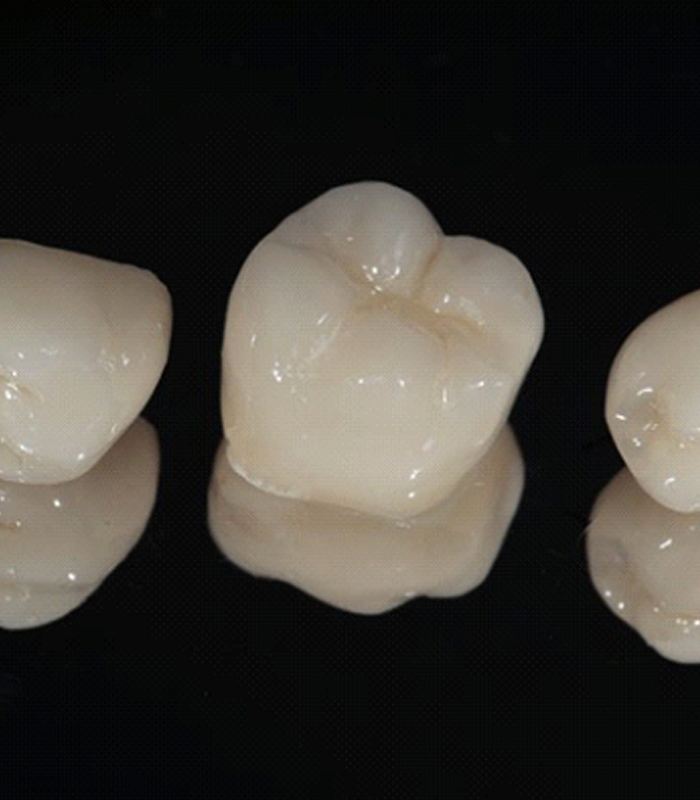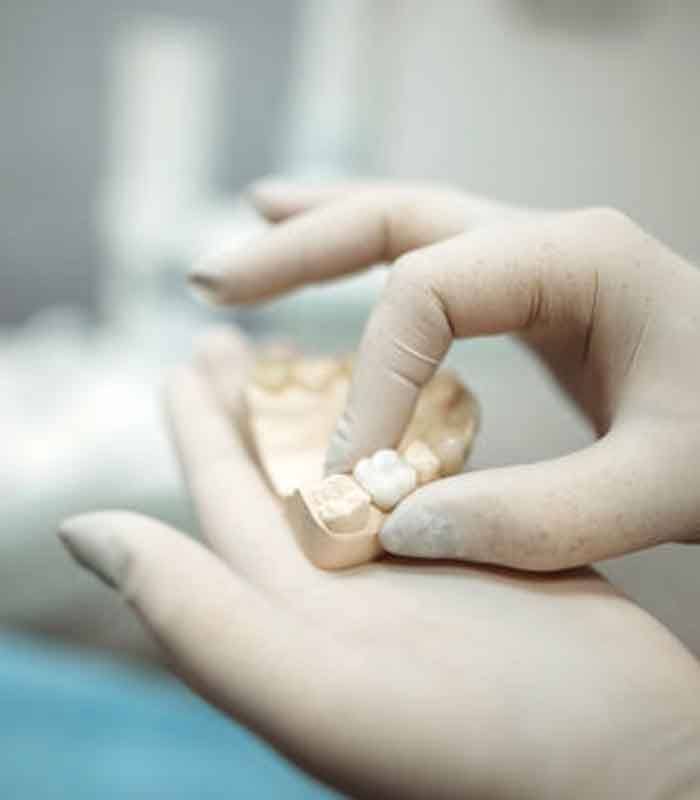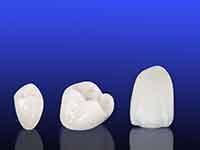
Dental Crowns – Jonesboro, AR
Fast Tooth Repair That Lasts
For small cavities, a filling is usually enough to restore the tooth. But if a tooth is severely decayed, broken, or worn, it will need more than just a filling to prevent it from weakening even further. In situations like these, Dr. Shane Smith can fit a dental crown over a tooth to build up its full structure and protect it from additional damage. These lifelike restorations are incredibly durable. If you’re interested in fast tooth repair that lasts, contact our office to learn more about dental crowns in Jonesboro, AR.
Why Choose Shane Smith DDS for Dental Crowns?
- Comfortable, Precise Digital Dental Impression Technology
- Locally Owned & Operated Dental Office
What Is a Dental Crown?
A dental crown is essentially a tooth-shaped shell that is cemented over a structurally compromised tooth. Crowns are most often placed in order to shield a vulnerable tooth from damage that would otherwise result in the need for extraction later on.
Dental crowns can be crafted from numerous materials. Here at Shane Smith DDS, we provide crowns made from durable gold as well as tooth-colored options like Emax, zirconia, and porcelain. Whatever the case may be, rest assured that we’ll recommend the type of crown that best meets your unique needs.
The Dental Crown Process

Before your dentist in Jonesboro can place a crown, the tooth in question needs to be prepared. In some cases, this means removing a small layer of enamel to create room for the crown. In others, such as an extremely decayed tooth, we might need to build up the tooth with filling material so that it can adequately support the restoration.
Traditionally, getting a dental crown takes two appointments: one to prepare the tooth, capture impressions, and place a temporary, and another to bond the final crown into place. After we reshape and take impressions of your tooth, our in-house milling machine begins fabricating your crown from a solid block of pressed ceramic. Once it’s finished, we’ll have you try it on, make any last-minute adjustments if need be, and cement the restoration over your tooth.
The Benefits of Getting a Dental Crown

When you restore a damaged tooth with a dental crown, you can look forward to benefits such as:
- Saving a tooth from having to be extracted
- A lifelike appearance (in the case of tooth-colored crowns)
- Chewing without discomfort
- Easy maintenance – just regular brushing and flossing should be enough
- Results that can last for 10 to 15 years or longer
Understanding the Cost of Dental Crowns

If you need a dental crown, you don't have to worry about a large bill. Many factors affect the cost of dental crowns, but Dr. Shane Smith has several solutions to keep them affordable. You won't have to compromise quality or aesthetics to stay within your budget. You'll benefit from a high-quality restoration that looks and feels natural.
Factors That Affect the Cost of Dental Crowns

Every mouth is as unique as fingerprints. Therefore, there's no one-size-fits-all dental crown. As a result, it's impossible to have a flat fee for a restoration. Many things will influence the amount you'll pay. Besides your initial consultation, your estimate may include:
- Preliminary Procedures: Dental crowns are versatile and can be used along with other procedures, like root canal therapy. Any additional dental work will be factored into the cost.
- Materials: The saying is true, you'll get what you pay for when it comes to materials for your crown. Discounted materials may not have the same durability or aesthetics. Our office offers Emax, zirconia, and porcelain crowns because they look natural and have proven to last for years.
Does Dental Insurance Cover Dental Crowns?

Every case is unique, but most dental insurance plans can be used for restorations. Your insurance may cover your consultation and diagnostic services for a copay. After meeting your annual deductible, your benefits may include some of the expenses for medically necessary procedures, including your crown. We will work on your behalf with your dental insurance to maximize your benefits and lower the amount you will pay.
Options for Making Dental Crowns Affordable

Besides dental insurance, our office offers other financial options to keep dentistry affordable. A member of our office will explain your estimate and review the fees. They will discuss your payment options, which include:
- Traditional Payments: Our office accepts all traditional payment methods for your convenience, including cash, personal checks, and most credit cards.
- Financing: Based on your credit approval, you may be a candidate for little or no interest in financing. You can pay any out-of-pocket expenses using a monthly payment plan.
- Specials: Our office offers regular promotions, which we will discuss during your consultation.
Dental Crown FAQs

Do you need a dental crown in Jonesboro, but have questions about the treatment? Below, our team has some of the most common concerns we receive from patients, along with our answers. If you don’t see what you’re looking for, please feel free to contact us directly—our team is always happy to help!
What can dental crowns be made from?
Dental crowns can be made from a variety of materials, some of the most popular being natural-looking ones like porcelain and ceramic. Here are all of the types of dental crowns that can be made:
- Porcelain-fused-to-metal crowns have a metal foundation with a porcelain layer on top to make them appear natural, while also being incredibly durable.
- All-resin crowns are typically lower in cost than most of their counterparts because they don’t last as long, and they have a natural appearance.
- All-ceramic or porcelain crowns are great for patients who need a crown on their front teeth or who have allergies to metal. They’re not as durable as porcelain-fused-to-metal crowns, but they still offer a long lifespan.
Are dental crowns permanent?
Technically, dental crowns aren’t permanent. However, once your tooth is fitted for a crown, it will always need one on it in order to keep it from becoming infected or severely damaged by harmful oral bacteria and decay. An average, a crown can last anywhere from five to 15 years with the proper care, so you’ll only need to replace it whenever your current crown fails or becomes damaged over time with use.
How do you know if a dental crown needs to be replaced?
There are a few common signs that your dental crown needs to be replaced or repaired:
- Pain can occur as a result of decay beneath the crown.
- Looseness or instability can happen if you chew on something hard and the crown becomes damaged or dislodged.
- Discoloration or visible damage can compromise the tooth that lies beneath your crown if it’s not addressed in a timely manner.
- A dark line at the base of the crown can occur with porcelain-fused-to-metal crowns and can indicate extensive wear-and-tear.
Are dental crowns safe for MRI?
This answer depends on the material that your crown is crafted from. All-porcelain, ceramic, and resin crowns won’t affect an MRI because they’re metal-free and won’t be impacted by the magnetic draw of the imaging machine. However, if you have a metal crown or filling, it isn’t safe for you to get an MRI. Before the process, you should be asked if you have any metal in your body by the imaging technician, so you won’t have to worry about any accidents occurring.
Are Dental Crowns Safe?
Dental crowns are perfectly safe for your smile. When placed by a qualified dentist, they won’t damage your teeth, gums, or any other part of your mouth.
You see, our crowns use harmless materials like zirconia and porcelain. These substances don’t contain toxins and shouldn’t cause any issues for your grin, let alone other body parts. The most they could do is trigger a mild allergic reaction – something unlikely but manageable.
With all that said, please call us if you suffer gum irritation, redness, or swelling near your crown. These symptoms could point to an allergy that you should treat.
What Can I Eat with a Temporary Crown?
While a temporary crown should let you chew comfortably, there are some meals it can’t handle. You’d best avoid certain foods and drinks until your permanent one is seated.
For instance, try to go easy on sugary and acidic stuff. There may be a gap between your temporary crown and gumline where sugars and acids could cause decay. If these substances reach your to-be-treated tooth, they’ll worsen your cavity.
You should also avoid hard or sticky foods. If you have too many of them, they’ll likely damage, loosen, or dislodge the temporary crown. Major examples of these products include tough breads, steaks, popcorn, nuts, chewing gum, etc.
Is It a Dental Emergency If Your Crown Falls Off?
Losing a dental crown isn’t a dental emergency; it’s an issue that can wait. Still, you should call your dentist and book a visit soon after the problem occurs.
Your tooth will suffer if you don’t get a crown reseated (or replaced) quickly enough. Over time, it’ll face an increased risk of decay, breakage, and other damage. Its dentin layer could also become more sensitive to hot and cold temperatures, leading to aches and soreness.
Given these points, you should do several things before your appointment. The first is to avoid chewing with the crownless tooth; you’ll avoid pain that way. Next is to bring your crown with you to your dentist's office. If the cap is still whole, they may be able to re-bond it to your tooth.
Do Dental Crowns Feel Natural?
Your dental crown should feel natural within days of its placement. In fact, you may not even notice its presence after a few weeks or so.
This result is partly due to a crown’s makeup. The cap’s materials withstand your bite as well as your enamel can, so eating with them shouldn’t feel strange. Their surfaces are also smooth and won’t irritate your tongue.
Crowns also feel natural because they’re customized. Since each is tailored to fit a patient’s tooth precisely, it won’t “stand out” to you or feel awkward.